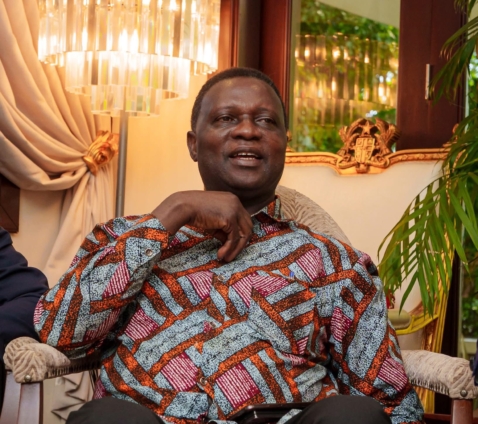Hair Today, Gone Tomorrow? Ghana's SHS Hair Policy Ignites Fierce Debate

A contentious debate has emerged in Ghana regarding the grooming policies in Senior High Schools (SHSs), specifically concerning female students' hair. Various prominent figures, including political leaders, media personalities, and former education ministers, have weighed in, offering diverse perspectives on the balance between discipline, cultural identity, practicality, and student well-being within the educational system.
Nana Akosua Frimpomaa, the Flagbearer of the Convention People’s Party (CPP) for the 2024 general elections, has voiced strong disapproval of the existing SHS rule that prohibits female students from braiding their hair. Speaking on Prime Morning News Flash, she challenged the rationale behind such a policy, urging the Ministry of Education to conduct a thorough review. Frimpomaa argued that these restrictions stifle self-expression and fail to align with Ghana’s rich cultural identity or modern educational values. She emphasized that learning to braid is an integral part of growing up and understanding one’s identity, suggesting that allowing students to embrace this practice would foster confidence and promote their natural beauty and cultural heritage. Her call to action stresses the importance of grooming rules that genuinely reflect Ghanaian identity and support the holistic development of students.
In contrast, Ghanaian media personality MzGee has taken a firm stance in support of the rule requiring female students to cut their hair before entering senior high school, asserting that the policy is grounded in practicality rather than punitive measures. Her comments follow a declaration by Minister of Education Haruna Iddrisu, who stressed that discipline and proper grooming are essential components of education and that "creeping acts of indiscipline," such as long or unkempt hairstyles, would not be tolerated. MzGee urged the public to adopt a realistic view, stating on her Gee O’Clock show that "Cutting the hair is part of discipline. You don’t always get things the way you want them. Life has rules, and it starts with this." She highlighted the significant challenges of maintaining long hair in crowded boarding school environments, citing limited resources and inadequate sanitation. MzGee argued that requiring short, neat hair helps uphold hygiene, ensures uniformity among students, and prevents distractions and social divisions that could arise from varied hairstyles, ultimately allowing students to focus on their studies. For her, this temporary adjustment is a practical choice for a structured environment.
Offering another critical perspective, former Education Minister Dr. Yaw Osei Adutwum has called for a fundamental shift in how schools approach student hair policies, advocating for directives rooted in hygiene and safety over mere discipline. Speaking on Adom FM’s Dwaso Nsem, Dr. Adutwum criticized the tendency to impose decisions without proper engagement, asserting that the hair issue is fundamentally about "hygiene and safety." He referenced the Accra High Court’s ruling in the Achimota School and Tyrone Marhguy case, which underscored the importance of fairness and understanding in school regulations. Dr. Adutwum explained that historical reasons for haircut rules revolved around cleanliness and academic focus, not punishment. Drawing parallels with international schools where long hair is permitted with safety measures like tying it in a ponytail during physical activities, he urged Ghanaian institutions to adopt a similar approach that prioritizes communication and understanding between educators, parents, and students. Furthermore, he advised that schools must make exceptions for students whose parents cite valid religious or cultural reasons, noting that courts would likely rule in their favor. Dr. Adutwum concluded that policies should be rational, grounded in health and safety, and explained to students for their own benefit, rather than simply enforcing uniform behavior.
The ongoing discourse reveals a complex interplay of values within Ghana’s education sector. While some advocate for policies that uphold cultural expression and individual confidence, others prioritize practical considerations of hygiene, discipline, and equality in a structured school setting. A third viewpoint seeks a middle ground, emphasizing health and safety as the primary drivers for grooming rules, coupled with flexibility and respect for diverse backgrounds. This multifaceted debate continues to challenge educational authorities to find policies that effectively serve the holistic development of students while respecting their rights and cultural heritage.
You may also like...
Super Eagles Set Sights on AFCON 2025 Glory, Despite Doubts from Greek Champion

Super Eagles captain William Troost-Ekong aims for AFCON 2025 gold in Morocco, learning from past experiences and leadin...
NBA Rocked by Gambling Scandal: Players, Coaches, and League Grapple with 'Dire Risks'

The NBA is aggressively re-evaluating its stance on sports betting regulations and player protection following federal i...
Funding Frenzy in Tokyo: 'Filipinana' and 'Garuda' Make Waves at Gap-Financing Market

Two distinct cinematic ventures, Indonesian animated feature “Garuda: Dare to Dream” and Rafael Manuel’s debut live-acti...
Hollywood Shockwave: Paramount Skydance Axes 1,000 Employees Amidst Industry Upheaval

Paramount Skydance is set to cut approximately 1,000 jobs this week as part of a major cost-reduction initiative followi...
Music Meets Diplomacy: Shakira & The Weeknd Join Global Board with Star-Studded Lineup!

Shakira and The Weeknd have joined the FIFA Global Citizen Education Fund's Advisory Board, aiming to make education mor...
KPop Phenomenon: HUNTR/X's 'Golden' Dominates Global Charts for 13 Weeks!

HUNTR/X's "Golden" from <i>KPop Demon Hunters</i> reclaims the No. 1 spot on both Billboard Global 200 and Global Excl. ...
Must-Watch Horror Masterpiece (92% RT) Now Streaming For Free!

The critically acclaimed horror film 'Barbarian', boasting a 92% Rotten Tomatoes score, will soon be available for free ...
Major UK Airline, Serving 1.3 Million Annually, Faces Imminent Collapse!

Eastern Airways, a UK airline operating since 1997, is reportedly nearing administration after filing a notice of intent...


